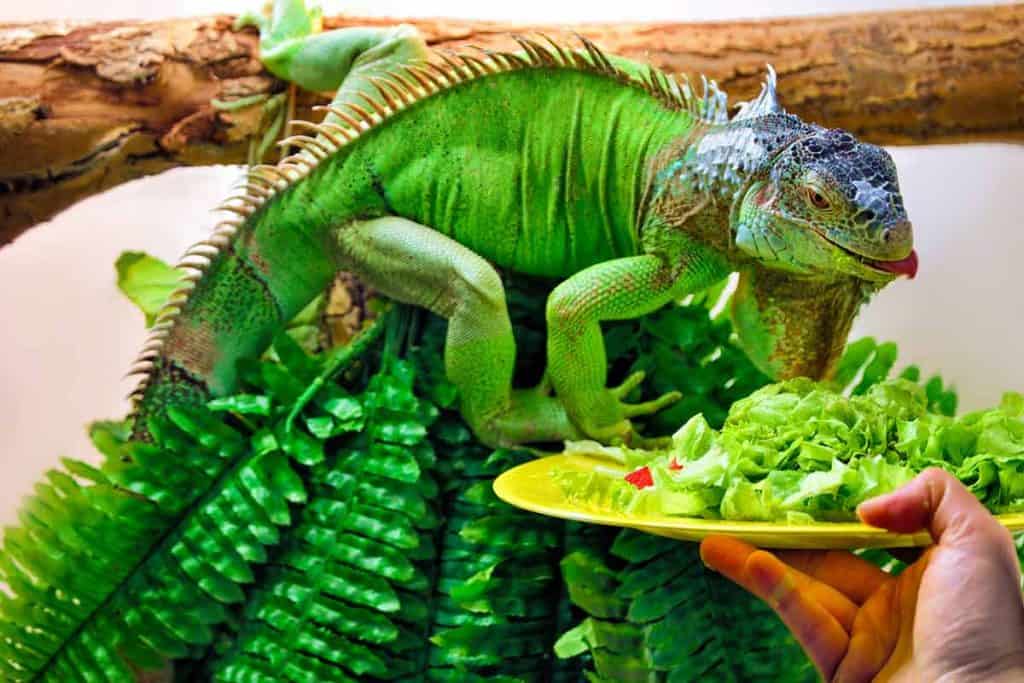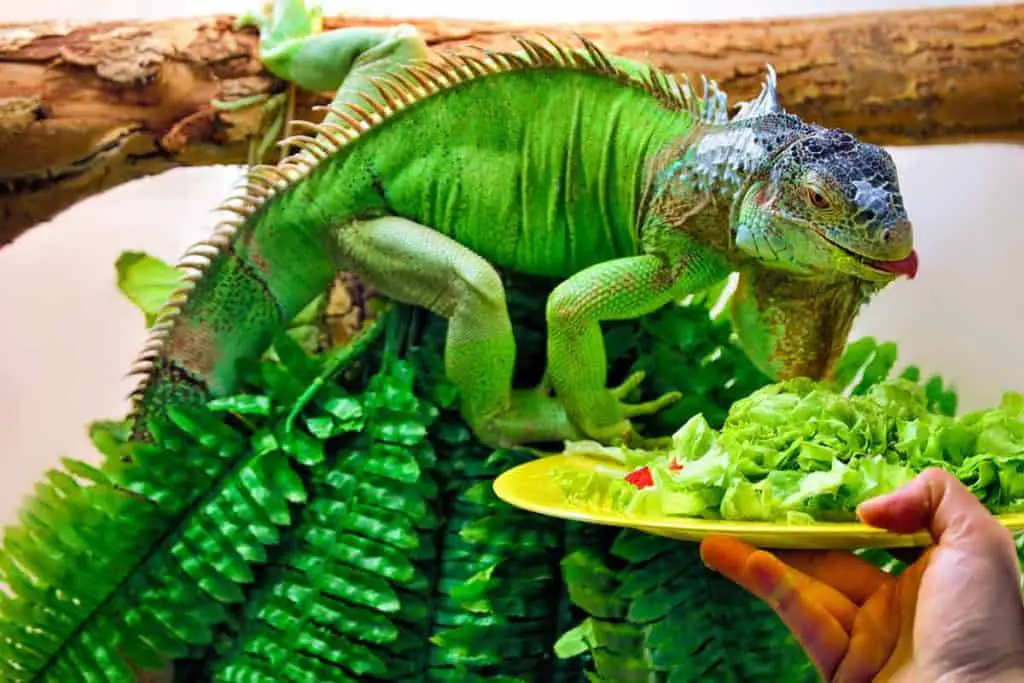Iguanas are fascinating creatures, and as a pet owner, you want to make sure they are getting the best diet possible. Kale is a popular and nutritious vegetable, but can iguanas eat it? In this article, we will explore the benefits and risks of feeding kale to your iguana, and provide you with the information you need to make an informed decision about your pet’s diet.
As a responsible pet owner, it’s essential to understand the dietary needs of your iguana. While some foods may be safe for humans, they may not be suitable for your pet. Kale is a leafy green that is rich in vitamins and minerals, but it’s important to know if it’s safe for your iguana to consume. Keep reading to learn more about the potential benefits and risks of feeding kale to your beloved pet.

Can Iguanas Eat Kale?
Kale is a green leafy vegetable that has gained popularity in recent years due to its numerous health benefits. Many pet owners wonder whether they can feed kale to their iguanas. In this article, we will explore whether kale is a safe and healthy food option for iguanas.
What is Kale?
Kale belongs to the Brassica family and is related to other vegetables such as broccoli, cauliflower, and cabbage. It is a nutrient-dense vegetable that is packed with vitamins and minerals such as vitamin C, vitamin K, vitamin A, and calcium. Kale is also rich in antioxidants and has anti-inflammatory properties.
Benefits of Feeding Kale to Iguanas
Feeding kale to iguanas can provide them with several health benefits. Kale is a good source of calcium, which is essential for the growth and maintenance of strong bones in iguanas. It also contains vitamin C, which helps boost the immune system and promotes healthy skin. Kale is also a good source of fiber, which can aid in digestion and prevent constipation in iguanas.
How to Feed Kale to Iguanas
When feeding kale to iguanas, it is important to ensure that it is fresh and free from any pesticides or chemicals. Kale can be given to iguanas in small amounts as a treat or as part of their regular diet. It is recommended to chop the kale into small pieces and mix it with other vegetables to make a balanced meal for iguanas.
Can Kale be Harmful to Iguanas?
While kale is generally safe for iguanas to eat, it should be given in moderation. Too much kale can lead to an imbalance of nutrients in their diet and cause health problems such as metabolic bone disease. It is important to ensure that iguanas have a varied diet that includes a mix of vegetables, fruits, and protein.
Kale vs Other Leafy Greens
While kale is a nutritious vegetable, there are other leafy greens that are also safe and healthy for iguanas to eat. Some of these include collard greens, mustard greens, and dandelion greens. These greens provide similar health benefits to kale and can be used as a substitute or addition to their diet.
Benefits of Other Leafy Greens
Collard greens are a good source of vitamin A, which is essential for healthy eyesight in iguanas. Mustard greens are rich in vitamin C and E, which help boost the immune system and promote healthy skin. Dandelion greens are a good source of calcium and can aid in digestion.
How to Feed Other Leafy Greens to Iguanas
When feeding other leafy greens to iguanas, it is important to ensure that they are fresh and free from any pesticides or chemicals. These greens can be chopped into small pieces and mixed with other vegetables to make a balanced meal for iguanas.
Can Other Leafy Greens be Harmful to Iguanas?
While other leafy greens are generally safe for iguanas to eat, it is important to ensure that they are given in moderation. Too much of any one type of green can lead to an imbalance of nutrients in their diet and cause health problems. It is important to ensure that iguanas have a varied diet that includes a mix of vegetables, fruits, and protein.
Conclusion
In conclusion, kale is a safe and healthy food option for iguanas when given in moderation. It is important to ensure that iguanas have a varied diet that includes a mix of vegetables, fruits, and protein. Other leafy greens such as collard greens, mustard greens, and dandelion greens can also be used as a substitute or addition to their diet to provide similar health benefits. By providing a balanced diet, pet owners can ensure that their iguanas remain healthy and happy.
Frequently Asked Questions
Here are some common questions about feeding iguanas with kale!
Can Iguanas Eat Kale?
Yes, iguanas can eat kale. Kale is a nutritious leafy green that is rich in vitamins and minerals that are essential for the health of iguanas. However, it is important to note that kale should not be the only food that iguanas eat, as a diet that is too high in kale can lead to health problems.
When feeding kale to iguanas, it is important to ensure that it is fresh and free from pesticides or other harmful chemicals. Kale should also be offered in moderation, and should be part of a varied and balanced diet that includes other leafy greens, vegetables, fruits, and protein sources such as insects or commercial iguana food.
How Much Kale Should I Feed My Iguana?
The amount of kale that you should feed your iguana depends on several factors, including its age, size, and overall health. As a general rule, kale should make up no more than 10% of an iguana’s diet, and should be offered in small amounts as part of a varied diet.
Ideally, iguanas should be fed a diet that consists of 80% leafy greens and vegetables, 10% fruits, and 10% protein sources. When feeding kale to iguanas, it is important to monitor their intake and adjust the amount accordingly to ensure that they are getting all the nutrients they need.
Can Kale Cause Health Problems in Iguanas?
Kale is generally safe for iguanas to eat, but it can cause health problems if fed in excess. Kale contains high levels of oxalates, which can bind to calcium and prevent its absorption. This can lead to calcium deficiency, a condition that can cause metabolic bone disease, a serious health condition in iguanas.
In addition, kale that has been treated with pesticides or other chemicals can be harmful to iguanas. It is important to always wash kale thoroughly before offering it to iguanas, and to choose organic or pesticide-free options whenever possible.
What Are Some Other Foods I Can Feed My Iguana?
Iguanas require a varied and balanced diet that includes a range of leafy greens, vegetables, fruits, and protein sources. Some good options for feeding iguanas include collard greens, mustard greens, dandelion greens, turnip greens, squash, bell peppers, blueberries, strawberries, and insects such as crickets and mealworms.
It is important to avoid feeding iguanas foods that are high in oxalates, such as spinach, beet greens, and Swiss chard, as well as foods that are high in phosphorus, such as broccoli and cabbage. Commercial iguana food can also be a good option, but should be used in combination with fresh foods to ensure a balanced diet.
What Are Some Signs That My Iguana Is Not Eating Properly?
Iguanas that are not eating properly may show a range of signs and symptoms, including weight loss, lethargy, decreased activity, and changes in behavior. In addition, iguanas that are not getting the right nutrients in their diet may develop health problems such as metabolic bone disease and calcium deficiency.
If you suspect that your iguana is not eating properly, it is important to consult with a veterinarian who specializes in reptile health. A veterinarian can help you develop a feeding plan that meets your iguana’s unique nutritional needs and ensure that it stays healthy and happy for years to come.
Green iguana eating kale
In conclusion, while iguanas are known for being herbivores, not all vegetables are suitable for their diet. Kale, for example, can be fed to iguanas in moderation as a treat, but it should not be the main component of their diet. It is important to provide a varied and balanced diet that includes a mix of leafy greens, vegetables, and fruits.
Additionally, when feeding iguanas, it is crucial to ensure that the food is fresh and washed thoroughly to avoid any harmful bacteria. It is also recommended to consult with a veterinarian or a reptile expert to create a suitable diet plan for your pet iguana.
Overall, iguanas can eat kale, but it should not be the only food they consume. It is essential to provide a well-rounded diet and consult with a professional to ensure the health and well-being of your pet.


